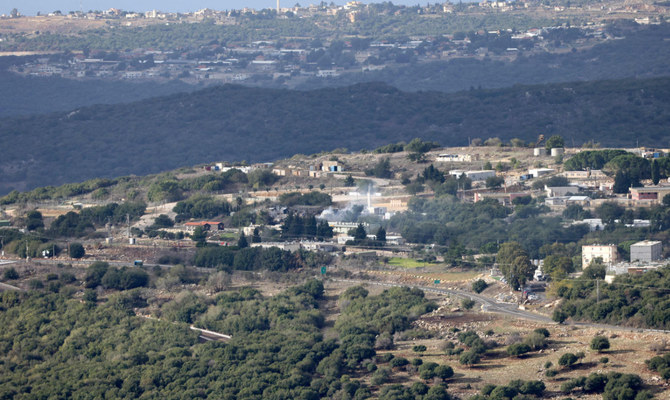
- ARAB NEWS
- 09 Jul 2025

BEIRUT: Hostilities carried out by Hezbollah against Israeli military outposts significantly escalated on Monday, with the group resorting to more developed destructive weapons.
Amid the qualitative military escalation on the southern front, Russian Ambassador to Lebanon Alexander Rudakov told Lebanese Foreign Minister Abdallah Bou Habib that “what was happening in the south is very dangerous and must be stopped.”
The Russian diplomat said, “Both parties mainly discussed the unfolding events in the region, especially in Gaza.”
The ambassador said Russia had been calling for peace and halting military operations in all international forums.
“We are in constant contact, following up on an array of topics and interests, whether bilateral or international,” he added.
The envoy’s reaction came as the Saydet El-Jabal group warned that the region is “heading toward a complicated and dangerous situation that requires the highest degrees of political vigilance and internal solidarity.”
The group, which includes politicians and public activists, also believes that Hezbollah is, once again, jeopardizing unity among the Lebanese people.
The comment follows a statement delivered by Sheikh Naim Kassem, Hezbollah deputy secretary-general, who said two days ago that it “will continue to be armed and trained despite all the Lebanese opposition voices.”
Saydet El-Jabal added: “How can Hezbollah say that it is protecting Lebanon’s national interest while it is placing itself above the constitution and the relevant international and Arab resolutions?”
The Israel-Lebanon border has seen daily exchanges of fire since the Israel-Hamas war began.
On Monday, Hezbollah announced hitting — for the first time — the Branit outpost with four Burkan missiles.
A video published by Israeli media showed the massive destruction caused by the missiles.
In two consecutive statements, Hezbollah confirmed that the purpose behind the shelling was “to support our resilient Palestinian people in the Gaza Strip and endorse its resistance.”
Israeli media reported that “25 missiles and artillery shells, in addition to a kamikaze drone, were launched from Lebanon toward the Kiryat Shmona and Margaliot settlements, causing damage to the place.”
The Burkan missile is designed by Iran and produced in the workshops of the Syrian army’s fourth division.
It is a short-range ballistic missile carrying an explosive payload of 500 kg — half a ton of explosives — with a range of up to 10 km. It is launched from short-range tactical launchers.
Each battery carries three firing nozzles mounted on the body of a tank for any armored vehicle or truck.
Hezbollah used this missile for the first time at the beginning of November when it targeted the Israeli Jal Al-Alam outpost opposite the Lebanese border village of Al-Dahira.
Hezbollah’s confrontations with the Israeli military on the Lebanese southern front have been ongoing for 44 days.
Hezbollah announced targeting “an Israeli infantry force on Al-Karantina Hill near the Hadeb Yaroun outpost, an Israeli infantry gathering in the vicinity of the Dahira outpost, and an Israeli infantry gathering in the Al-Tayhat Triangle, causing direct hits.”
The group has also announced targeting “the Zibdeen outpost in the occupied Lebanese Shebaa Farms with appropriate weapons, in addition to targeting a gathering for the Israeli occupation forces in the west of Kiryat Shmona with three drones.”
The Israeli army responded to Hezbollah’s operations through ground and aerial bombardment, targeting many locations in Lebanon.
The army said that “rocket-propelled grenades were launched from Lebanon toward Kiryat Shmona,” adding that “three drones were intercepted in the Upper Galilee.”
Artillery shelling has targeted the outskirts of the villages of Yarine, Al-Dahira, Tayr Harfa, Rab Al-Thalathin, Mhaibib, and Al-Jabin.
Israeli artillery has also targeted the outskirts of the villages of Houla, Wadi Saluki, Yaroun, and Naqoura, in addition to a forest between Deir Mimas and Kfarkila.
The fire caused by Israeli artillery has trapped a farmer in the valley located between Markaba and Houla.
The region between the Rmaych and Ayta Al-Shaab villages was subject to direct artillery bombardment. The shelling also reached the house of MP Kabalan Kabalan in Mays Al-Jabal.
Israeli helicopters also bombed the outskirts of the Maroun Al-Ras village.
According to Israeli media outlets, Hezbollah has launched “over 1,000 missiles from Lebanon toward Israeli targets since the beginning of the operations.”
The Al-Manar website affiliated with Hezbollah published “a table showing that the number of Israeli army casualties scattered across hospitals of settlements bordering Lebanon amounted to 1,523.”
Israeli bombing hit on Sunday afternoon a civilian car driving from the border village of Odaisseh to Kfarkila.
Lebanese citizen Sanaa Hussein Rislan was with her son when the artillery shell landed near them.
She was injured and transferred to a hospital for treatment.
Almost all the border region residents have evacuated the area and fled north of the Blue Line.
The Disaster Risk Management Unit in the Union of Tyre Municipalities announced that, as of Sunday, the number of displaced Lebanese reached 16,276, scattered across the villages of the district and four shelters.
The unit added that it was working in cooperation with associations and international organizations to secure the needs of displaced people within the available means.
As winter approaches, the number of displaced people is increasing daily, which adds a burden to securing heating in shelters.